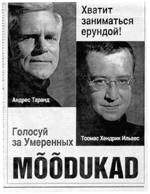
Issue #05/60, March 10 - 24, 1999 

| In This Issue |
 |
| Why Democracy Doesn't Work |
| Peaches 'n Hate |
| The Bolshoi Berezovsky |
| Negro Comix |
 |
 |
![]()
The first things you see when you get off the train station in Tallin are political campaign posters. Everywhere. Judging by the pictures on the campaign posters, Estonian politicians come in two varieties: the vaguely pained, craggy-faced Wim Wenders groupies, and the bank clerks.
There was a time when Estonia was revered for its incredible bravery, playing David against the mighty Soviet Goliath. Its partisans held out in the forests against the Soviet occupation reportedly until 1978. Its legislature was the first to declare sovereignty from the Soviet Union in 1988. They fought, they struggled, they suffered... for what?
Meet Estonian President Lennart Meri. Described as "philosophical" by a recent article in the Associated Press, Meri masks his utter dullness with a pretentious schtick so transparent that he would barely qualify as a lower angel in Wings Of Desire, which ranks as the worst film ever made.
"Any question brings a smile, a long pause, and a lengthy metaphor-filled response that eventually answers the question," the article on Meri says. "'I was so touched with my own words,' he said at the end of the meeting."
Ooo. Deep. Er, what?
That's what Dr. Dolan and I were asking ourselves when we showed up to Estonia last weekend for the big elections. It just didn't make any sense. Newspaper reports gloating about the "booming" new Estonia, evidenced by the nauseating abundance of cell-phones, something that impresses every Western reporter. Moreover, you can't read a single goddamn Estonia-related piece without the requisite schadenfreude aside about how much better Estonia is doing than Russia. With the underlying premise that Russia--a massive, unpredictable almost feral empire--has anything at all to learn from the experience of a tiny city-state like Estonia.
We arrived hoping that if the elections story didn't catch on, then at least the disenfranchised-Russians story would. Perhaps we'd foment an uprising, or at least be able to have enough material to lie about one. Wrong.
Sure, Estonia discriminates against the Russian minority. Laws read like something out of the Nazi party platform from the 30's. Only Estonian-speaking people can hold higher posts, even in private firms. Russian-speaking candidates weren't legally allowed to print posters or materials in Russian. Three hundred Russian-speaking policemen were sacked en masse just over a month ago for not speaking fluent Estonian--an obscure Finno-Urgic language not even vaguely related to the Indo-European branch. The discrimination has been so blatant that even the EU and the United States were forced to blush and make a show of slapping the Estonians' wrists--that is, until the Estonians amended the citizenship law to allow anyone born after 1991 to automatically become a citizen of Estonia. That very minor change to an otherwise brutal law allowed a couple thousand Russian-speaking babies to become citizens, thereby appeasing the EU and the United States, which just issued a statement praising Estonia's citizenship laws as being in line with international standards. In spite of the fact that almost a third of its residents--that is, Russian-speakers-- are stateless.
You'd think that would upset the Russian-speakers a bit. You'd think the Russian state would rattle it's sword a little, the way it did in Latvia. Think again. While some complained about job discrimination and an ethnic glass ceiling, most, particularly in the Russian-speaking town of Narva, didn't have a strong opinion one way or another.
Now you're probably saying to yourself, "Oh joy! This is what democracy is all about! It's about people working their problems and overcoming discord through mutual consent." And who better to lead Estonia into the Bland New World than Wim Wenders wannabes and aspiring bank clerks like those candidates listed on the eXile cover.
It took one long weekend in Estonia to bring back to a boil some of those very violent feelings towards democracy that I felt way back in the hot California days, before moving to Russia. Out here, where even the veneer of democracy hasn't existed except in the minds of a few gullible Western reporters and Stanford Professor Michael McFaul.
The McFauls of the West never gave a hoot about how much suffering the Russian population endured since 1991, so long as they were willing to at least pretend that they respected. That's because middlebrows like him have taken democracy--which was an accident in human history, an accident that turned out to be the most successful and durable means of imposing rule over a population--to be morally "good" without stopping to think why. If democracy means retooling Russia into a bland, harmless, diminished land of quietly struggling consumers whose greatest achievement is squeezing out the odd metaphor for foreign reporters, then I turn in my ticket.
In honor of the eleven sperm-headed Estonian parliament-seeking dorks on the cover of this issue, the eXile proudly presents its "Eleven Reasons Why Democracy Sucks".
1. 'Cuz Democracy Sucks. Looks like we're not the only ones who think this way. So does the West. When citizens of a non-Western country vote into power someone who doesn't like us, we get very, very mean. When the Algerians voted in an Islamic regime, we kept mum on the military coup d'etat that annulled the vote. Today, we barely raise a peep over the fact that tens of thousands of Algerians have since died in a civil war. Belarus votes in anti-Western Lukashenko, and relations turn ice-cold; Kazakhstan and Azerbaidjan rig elections in favor of pro-Westerners Nazarbayev and Aliyev, and receive decorative slaps on the wrist while major Western investment is encouraged. Iran is the only Persian Gulf country practicing democracy, and not coincidentally, only one of two Persian Gulf countries that the West is constantly fighting to destroy. The Serbs voted in Milosevic and even farther-right candidates, and we're threatening to bomb them. The Bosnian Serb president didn't give a pro-Western Serb parliamentarian whose faction won a majority in the Bosnian Serb parliament a chance to form a government, so the elected president was sacked last week by an appointed Spanish administrator, Carlos Westendorp. Conversely, in Estonia's weekend elections, reports say that nutty Estonian President Lennart Meri has refused to allow Edgar Savisaar, whose Center Party won the most seats, the first right at forming a government because Meri apparently dislikes the former communist boss. No word from the EU on whether air strikes will be called in on Estonia, but somehow, we doubt it. And oh yeah, don't forget, Hitler was voted into office in a democracy.
2. Bumper Stickers. In democracies, citizens can place bumper stickers on their cars boldly expressing pre-fabricated opinions. In a properly functioning authoritarian regime, such idiocy would be punishable by diligent application of a rusting Sears Die Hard car battery to the offender's genitalia, thus discouraging one's proudly idiotic individuality.
3. Uniforms. In democracies, men wear durable suits, and women wear durable skirts and durable blazers with Reeboks. They're uniforms all right, but uniforms intended not to impress or excite the mind, as for example the overtly erotic, glorious Fascist uniforms of the 20s, but rather, to let their opposite numbers know that they're just as bland and harmless as the other person.
4. Born In Sin. All modern democracy descends from Athens. But what about Athenian democracy? Was it born of a virgin mother? Not quite. In 510, an aristocrat named Cleisthenes, whose family, the Alcmaeonids, had rivaled the tyrant Hippias, wanted to take power after the latter died and thus return his rich family to Athens. Lacking a strong power base among the elite, he cynically decided to appeal to the mob by promising them representation in return for naming him their leader. Thus was born Athenian democracy--which, you'll remember, wasn't all that democratic when you subtract women, slaves and propertyless slackers from those allowed to vote--by some estimates, only about 10%, meaning it was sort of a glorified rule of aristocracy. Interestingly, the poor often supported tyrants against the aristocrats in ancient Greece precisely because they hoped that the tyrants would help them against the oppressive aristocrats. It was the aristocrats who hated the "tyrants," and because of aristocrats, the word "tyrant" acquired its negative connotation.
5. Mustaches.
 |
6, 7. Andres Tarand & Toomas Hendrick Ilves. Look at the picture of these
 |
8. The Sex Is Bad. It's just a plain fact that sex is far worse, far more psychology-heavy and mediated in a democracy than in a totalitarian regime. Without a little fear in the air, who can get hot 'n horny? Not me.
9. Because envious women make up 51% of the vote, no sexually attractive woman will ever be elected to any office. (See Matt Taibbi's article)
10. Freedom of Choice. The most overrated concept of the 20th century. Aside from the fact that it's a pure fiction, even within the narrow limits of choice that we have in our lives (work, love, health, money), the very concept of choice has meant that increasingly, no one can commit to anything anymore, because they're always afraid of making the wrong choice. Better if someone made their choices for them. Better if a Big Brother were around.
11. the eXile. Funny thing, but we'd be sued out of existence within a few weeks of appearing in any Western democracy, but here in Russia, in the so-called kleptocracy, the power elite has been too busy stealing and killing to give a fuck about us, allowing us to fly around the capital beneath their radar, like a cruise missile. A real democracy would never let us get off the ground.
Welp, there you have it, folks. If those 11 reasons aren't enough to make you fight for the over throw of the bourgeois-capitalist regimes in a burst of worldwide revolutionary fever, then we're just not doing our job. Da zdravstvuite, Revolutsiya!
